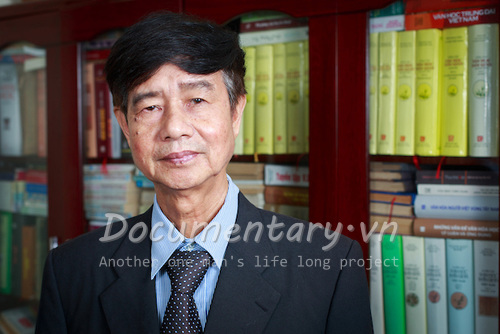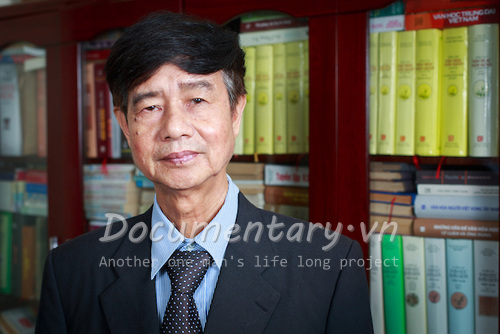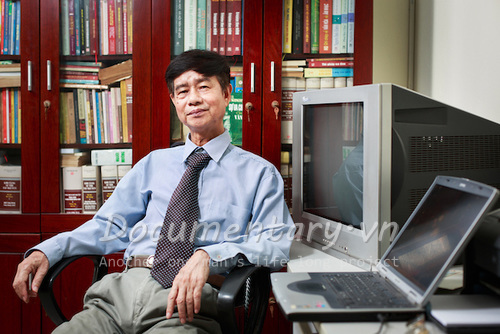
Staying at Hanoi University in 1966 – a fierce period of the war against the US – he recalled the early days of his career without mentioning the hardships and difficulties, always considering himself fortunate. At that time, he had the opportunity to interact with and learn from teachers he called "giants" in the field of folklore research, such as Professors Dinh Gia Khanh, Chu Xuan Dien, and Vo Quang Nhon, and researchers Vu Ngoc Phan, Cao Huy Dinh, Bui Van Nguyen, etc. From his admiration for these teachers and researchers, he continuously improved and developed himself, and in turn, he contributed to building the foundations for the then-nascent field of folklore studies in Vietnam. His extensive field trips across the country, from the lowlands to the highlands, the Northwest, the Central Highlands, etc., along with his teachers and colleagues, helped him write valuable works and research papers on culture and folklore, such as:The classification of folk songs of ethnic groups in the North of our country"Literature Magazine, issue 6, 1975);The first step is to explore the elements of daily life and beliefs/rituals in the formation of "Then".(Literature Magazine, No. 4/1976);Proverbs, folk songs, and folk music of Ha Tay(co-authored) (Published by the Department of Culture and Information of Ha Tay Province in 1975, reprinted in 1993);The area along the Nhi River(co-authored) (Published by Hanoi Literary and Artistic Association, 1979).

Professor, Doctor, Distinguished Teacher Le Chi Que
With his extensive theoretical and practical knowledge, and his simultaneous focus on Vietnamese folklore and the folklore of ethnic minorities throughout his research, he absorbed the research findings of his predecessors and made a breakthrough in establishing a common genre framework for the folklore of a unified, multi-ethnic Vietnam. While many researchers previously tended to separate Vietnamese folklore from that of ethnic minorities, arguing that Vietnamese folklore had its own classification framework, different from that of ethnic minorities, Le Chi Que broke away from this "centrism" and included all works and folklore legacies of both majority and minority ethnic groups within a common classification framework. His recognition of the contributions of ethnic minorities in shaping the folklore landscape of a unified, multi-ethnic nation is most clearly demonstrated in the textbook he edited:Vietnamese folklore(Hanoi National University Publishing House, 2004). In this textbook, the system of Vietnamese folk literature genres established by him follows both a historical process and typological characteristics (using the historical typological method), with genres arranged according to historical progression, such as: Mythology, Epic, Legend, Fairy Tale, etc.
While his teachers, notably Professor Dinh Gia Khanh, were deeply influenced by French scholarship through their training at French schools in Indochina, Le Chi Que belonged to a generation clearly influenced by Russian scholarship. However, for him, Russia was merely a gateway to the world. During his studies of folklore at the Faculty of Philology of Lomonosov Moscow State University, in addition to focusing on summarizing the theories and methodologies of Russian folklore researchers, he also actively explored prevailing theories worldwide, most notably the typological theories of Finnish and American folklore researchers, and he pondered how to apply them to the study of Vietnamese folklore. Later, upon returning to Vietnam, he wrote a series of articles on this topic.typology in folk literaturePrint space in the MagazineFolklore(1985-1990) He developed the applied aspects of this method into chapters in the textbook "Vietnamese Folk Literature," which he edited and wrote most of the chapters for, as a way of sharing the knowledge he had acquired abroad. In 1994, he wrote an article.The Finnish School of Folklore - Theoretical Principles and Applications(Literature Magazine, No. 5/1994) to introduce the typological theory of Finnish folklorists and to present prospects for its potential application in Vietnam. He was also the first to introduce the typological theory of the Finnish school into the study of fairy tales and legends in Vietnam, and based on typological theory and practice in Vietnam, to establish legend as an independent genre of Vietnamese folk literature.

Le Chi Que's work involves researching Vietnamese folklore, a subject that may seem specialized and even outdated, but he is constantly learning and always takes advantage of every opportunity to exchange ideas with the academic world. He became a member of the International Association of Folklore Narrative Research very early on (in 1995), which allowed him to continuously update himself on new trends in folklore research worldwide. In 2001, he attended the International Folklore Congress in Melbourne, sponsored by the Australian Folklife Association, where he had the opportunity to interact and exchange ideas with renowned folklorists. In 2004, he spent six months in South Korea on a scholar exchange program organized by the Korean Ministry of Foreign Affairs and presented his research on "Founding legends in Korea and Vietnam"This was stated at the Vietnam Studies conference in Seoul in August 2004. His outward-looking approach to learning and self-improvement has helped him enhance his research capabilities, increase his contributions to Vietnamese folklore, and gradually place Vietnamese folklore on the international folklore map. Perhaps it is this openness and international integration that has attracted many foreign graduate students and researchers to seek him out as their mentor. He has successfully guided many graduate students and researchers from Korea, China, and other countries in defending their theses and dissertations."
During his teaching and work at Hanoi University, now the University of Social Sciences and Humanities (Vietnam National University, Hanoi), Professor Le Chi Que dedicated his full time to working at the Department of Folklore Studies (Faculty of Literature). Always concerned with affirming the position of folklore studies, he was instrumental in separating the Department of Folklore Studies into an independent department within the Faculty of Literature (in 1985). He then contributed to the development and revision of the doctoral program in Folklore Studies, which became operational in 1987, and successfully developed the master's program in Folklore Studies (in 2008).
Even now, at the age of "seventy," Professor Le Chi Que still doesn't allow himself to rest. He continues to ponder the fate and evolution of folk literature in contemporary society. Recently, he and a former student (Associate Professor Ngo Thi Thanh Quy) published a research paper in a journal.Literary and artistic criticismIssue number 4 of 2014 is namedTraditional folk literature in the commune festival Modern VietnamProfessor Le Chi Que shared that he still deeply hopes that the field of Vietnamese folklore research will develop and become as stable as a three-legged stool: theoretical folklore, world folklore, and Vietnamese folklore. Professor Que believes that, to contribute to the country's academic landscape, an exemplary folklore researcher must be someone who understands both the theoretical aspects of folklore, world folklore, and is also an expert on Vietnamese folklore. With the standards Professor Que has set, could it be that he himself is a true folklorist?
|
PROFESSOR, DOCTOR, OUTSTANDING TEACHER LE CHI QUE
+ Workplace: Faculty of Literature (1966 – 1996) Faculty of Tourism (1996 – 2000) Faculty of Literature (2000 – present) + Management position: Deputy Head of the Faculty of Literature (1985-1989). Head of the Faculty of Tourism (1996-2000). Head of the Department of Folklore Studies, Faculty of Literature (2006 to present).
Folklore: Survey and ResearchHanoi National University Publishing House, 2001. Vietnamese folk literature(Editor), Hanoi National University Publishing House, 2004. Professor Dinh Gia Khanh, a pioneering educator and scientist.(Manuscript organization, editing, co-authoring), Youth Publishing House, 2014. |
Author:Lu Thi Thanh Le